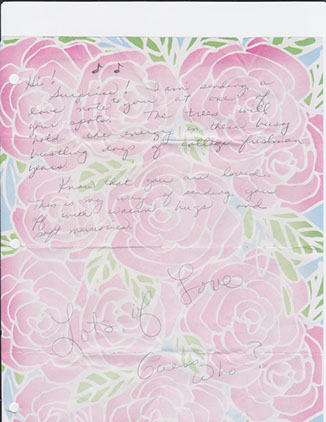
Graduate School: Michigan State University

Upon arriving to Michigan State University for graduate school, I knew that I could do writing center studies and that I was a good student with some skills in writing, but I had put aside my curiosity in happiness and the opening of my heart, which resided in California. I had closed the door of listening to my parents' pedagogy of happiness that I had followed: trusting my choices, guiding myself based on what made me happiest, and allowing myself to learn about giving to my surroundings through my passions.
During my first semester, as I was reading for my History and Theories of Rhetoric course, I came across some of Aristotle’s perceptions about happiness in the Nicomachean Ethics. He states, “Now happiness above all else appears to be absolutely final in this sense, since we always choose it for its own sake and never as a means to something else; whereas honor, pleasure, intelligence, and excellence in its various forms, we choose indeed for their own sakes (since we should be glad to have each of them although no extraneous advantage resulted from it), but we also choose them for the sake of happiness, in the belief that they will be a means to our securing it. But no one chooses happiness for the sake of honor, pleasure, etc., nor as a means to anything whatever other than itself" (1097a37-b6). After reading Aristotle's words, I was reminded of my curiosity about how happiness is taught and perceived in the world.
As I continued to read, a repeated theme that emerged was "happiness is a choice." This was taught by Aristotle as well as the Dalai Lama, Tal Ben-Shahar, Doug Smith, Barbara Fredrickson, Gretchen Rubin, Oprah, Brene Brown, Deepak Chopra, Eckhart Tolle, Ronda Byrne, and Jeffrey Sachs, to name a few popular and scholarly teachers.

Pedagogy of Parents
My parents also taught that happiness was a choice. It was taught in their hugs; it was taught in their notes; it was taught in their food; it was taught in their education; it was taught in their love for animals; it was taught in their once-love for each other; it was taught in their divorce; it was taught in their love for my sister and me; it is taught in our conversations today.

Reason for Crying
I cried in class two months ago. I didn't cry because I was unhappy. I didn't cry because the words were locked inside my throat. I cried as the first step in telling a pedagogy of happiness, which is writing, rewriting, telling, retelling "the stories we long for" because they are "obtained and maintained through love, respect, and expressions of gratitude for the generosity of those who share the secrets of the past with us" (Hidalgo 5).
""Historicizing the emotions, or forms of feeling, is itself as important a history as is the social and cultural history in which it is intertwined."
– Kathleen Woodward
Hidalgo | Chambers | Hutchinson | Shade-Johnson | Brentnell | Leger | Braude | Sweo | Nur Cooley
Published by Intermezzo, 2018